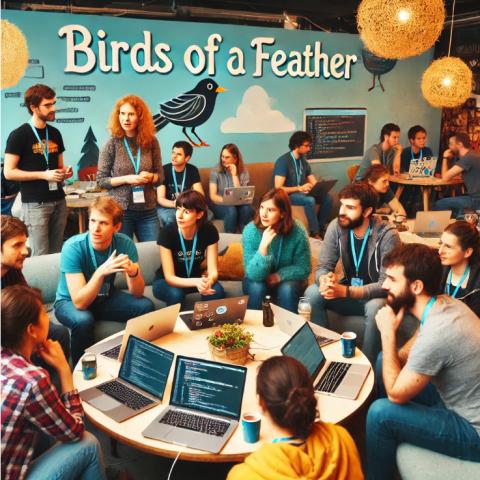It's undeniable that today's software innovation stems from the Open Source community. Celebrating 20 years of the Eclipse Foundation, the EclipseCon has evolved into the Open Community Experience (OCX). This rebranding reflects the foundation's expansion beyond developer tooling into diverse domains like real-time embedded systems, Dataspaces, Java ecosystems (Adoptium, JakartaEE, Microfile…), Cloud Development Tools, Open VSX, Software Defined Vehicle, IoT among some others…
Why Attend OCX 2024?
If you work in the software industry, convincing your boss to attend OCX 2024 should be a top priority. The topics covered are essential, not just for staying current, but for understanding the radical changes reshaping our field.
AI Impact on Developer Workflows: AI is revolutionizing IDEs, with tools like AI-powered code completion and bug detection, dramatically boosting productivity.
Cloud-Native Technologies: These technologies are transforming how applications are built and deployed, offering unparalleled scalability, flexibility, and resilience. As organizations rapidly adopt cloud-native approaches, understanding their impact on security, performance, and cost-efficiency is crucial.
Developer Experience (DX): Improving DX is a key differentiator, making developers more productive and satisfied, which is critical for retaining top talent.
Sessions that have particularly caught my attention on #AI
Haishi Bai from Microsoft would explore how Generative AI is transforming industrial toolchains by automating complex processes, enhancing information management, and improving system management and monitoring. This could be particularly interesting for industry professionals and researchers, as it might offer insights into the future of industrial operations, showcasing the potential of AI to optimize workflows and provide intelligent, real-time solutions.
Philip Langer from EclipseSource would discuss integrating AI into domain-specific tools, like code editors. This could be particularly interesting for developers seeking to enhance tool functionality, as it might improve AI's ability to understand and interact contextually, leading to more efficient and intelligent user experiences.
Jonas Helming from EclipseSource would present a vision for an open source, AI-driven IDE based on Theia. This could be particularly interesting for developers concerned about privacy and flexibility, as it might offer a customizable alternative to proprietary AI tools, allowing users to choose their AI models, control data sharing, and optimize interactions to suit their needs.
Jinbo Wang from Microsoft and Martin Lippert from Broadcom would discuss enhancing GitHub Copilot to better support Spring developers in VSCode. This could be particularly interesting for those working with Spring, as it might provide more relevant and accurate AI-generated coding suggestions, improving the overall development experience. The session includes live demos to showcase how these enhancements function in practice.
And on #CloudNative
Yasmin Aumeeruddy from IBM would explore how developers can leverage tools like OpenTelemetry and MicroProfile to improve observability in cloud-native applications. This could be particularly interesting for Java developers, as it might offer insights into diagnosing issues within complex cloud systems, drawing parallels with medical diagnostics to enhance understanding and application performance.
Kenji Kazumura from Fujitsu Limited would discuss techniques for troubleshooting Java applications in minimal container environments, balancing security, performance, and debugging needs. This session could be particularly interesting for developers using Docker/Kubernetes, as it might provide valuable insights into using ephemeral containers and tools like 'perf' to effectively diagnose and resolve issues without compromising security.
James Hunt from Aicas GmbH and Jürgen Albert from Data in Motion would discuss the challenges and strategies involved in migrating an AWS cloud application to a cloud-agnostic solution. This session could be particularly interesting for those aiming to reduce dependency on specific cloud providers, as it might offer insights into building modular applications that run efficiently both on-premise and across various cloud environments using standard services.
A Special mention
Lastly, I will immodestly mention the session I will have the honor of presenting with John Kellerman: “Navigating the Evolution from Desktop to Cloud IDEs: A strategic evaluation of Eclipse IDE and Eclipse Theia”
Our talk might catch your interest if you're involved with the Eclipse Theia and/or the Eclipse IDE ecosystems. We’ll delve into the strategic considerations for adopting Cloud IDEs vs Desktop-based IDEs and look at when mixing Cloud-based and Desktop-based IDEs might be an option.
Collocated events and beyond…
With six collocated events, registering for one gives you access to all, maximizing your learning and networking opportunities. Here are the events:
- EclipseCon
Connect with innovators shaping the future of Open Source developer tools. - Open Community for Java
A new event to explore the latest in Java innovations with passionate experts. - Open Community for Automotive
Another new event focusing on the future of Open Source automotive software. - OCX Tracks
Explore relevant topics for all Open Source developers at OCX 2024. - eSAAM on Dataspaces
The 4th Eclipse Security, AI, Architecture, and Modelling Conference focusing on data spaces. - OSGi Community Summit
Join discussions on the latest in OSGi technology, tools, and libraries.

But beyond the sessions, what really makes OCX special is the community. The Birds of a Feather (BoF) meetings at the end of each day are where the real magic happens. It’s in these informal settings —often over a drink— where ideas flow freely, connections are made, and new collaborations are born. It’s these moments that I look forward to the most!
Looking forward to seeing you there! Here is the detailed agenda and the registration link
